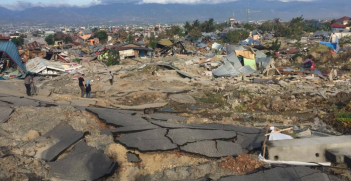Is Argentina Back on the World's Map?

While the South American giant had become an international non-entity, the election of Mauricio Macri prompts five factors that may bring it back to heavyweight status.
Argentina has the second largest economy of South America (after Brazil), its third largest population (after Brazil and Colombia) and, in spite of all the problems of recent years, the region’s second highest GDP (PPP) per capita (after Chile). It’s a huge country whose agricultural potential and agro-business productivity are phenomenal, it has large reserves of gas and, for almost a century and in spite of recent difficulties, it has boasted one of the best-educated population of the continent.
And yet, it has had no significant international or even regional presence or influence for at least 50 years.
During that period, with brutally authoritarian or utterly dysfunctional democratic political systems, inconsistent public policies and one of the world’s most volatile economies, it has lived in a world of its own, its eyes fixed on its own wooly bellybutton or, at best, worrying periodically about Brazil and Chile, and talking of retaking the Malvinas. Meanwhile, along with Brazil, it has stayed at the margin of the world’s biggest trade initiatives, playing short-term games of market access and market restrictions within Mercosur and has even hampered Brazil’s tepid efforts to reach a trade agreement with the European Union. Unlike Brazil, however, it hasn’t even tried to have an active diplomacy, any kind of credible presence or even just visibility in the world.
The last decade has been particularly pathetic as Buenos Aires has become—in the name of a delirious anti-imperialism, and as Washington was in fact dis-engaging from the continent—the perky groupie of tragically clownish Venezuela. On top of the domestic economic mess, such an attitude further dampened what little interest remained among global investors.
Predictably, as a result, on no big issue does anyone think of asking Argentina, getting Argentina on board, or even worrying about what Argentina will do. It has essentially become an international non-entity.
Now, this may well change pretty quickly, and the catalyst for that change could be the remarkable victory of centre-right Mauricio Macri in the second turn of the country’s presidential elections, on Nov. 22. At least five factors could drive such a change.
A likeable liberal face: The first one is that the region is clearly taking a liberal turn, with the resource-driven left-populist episode reaching a dramatic end in Venezuela and Brazil, and a more confused one in Chile. Resources obviously were key to the success of the liberal economies of the Pacific Alliance, but the latter have proven to be much more resilient in the face of the collapse of global commodity prices. None of these countries, however, has challenged Brazil’s somewhat embarrassed or—improbably—Venezuela’s much brasher claims to leadership in the region. In other words, liberal-democratic Latin America doesn’t have a face, and Macri could be it.
A clear stance on Venezuela: Second, the inability or unwillingness of any major Latin American state to take clear and consistent stands on democracy and human rights violations in the region leaves a gaping hole that Macri’s strong stance on Venezuela was already beginning to fill, even before he was finally elected, and very quickly again, as soon as he was. At last, and for the first time in this century, the leader of a major country of the region would call a cat a cat.
A leadership gap in the region: Third, all the potential claimants to some kind of political leadership in the region are busy with their own domestic agendas and have little to gain from a visible regional or international role. By order of importance: (1) Brazil is confronting four major crises at once: the impeachment process of its president, the corruption scandal around Petrobras, the deepest recession in a generation and an insect-born microcephalia epidemic; (2) Colombia under Juan Manuel Santos is spending all its political capital on the peace process with the FARC; (3) Venezuela is on the verge of economic, political and social collapse; (4) Chile’s Michelle Bachelet has seen her power erode dramatically since her election less than two years ago. Crucially, it is difficult to imagine any of those leaders gaining much from claiming some kind of visible international role for herself or himself. In all cases, such a move would in fact be seen domestically as a smokescreen and backfire badly.
A window for Macri: Argentinians, by contrast, and this is my fourth factor, would welcome the symbolic comfort that a globally pro-active and visible head of state would generate. Just as Lula—in the fine words of ANU’s Sean Burges—surfed domestically on the “auto-estima” that his sudden international celebrity was bringing to Brazil, Macri could easily capitalize on the need for international respect that Argentinians have for decades channelled into bitterness, conspiracy theories and self-deprecating humour.
The U.S. needs an ally: Fifth, the United States is losing Colombia, its best friend in the region, to the need for Bogotá to free itself from the utterly abusive but nonetheless broadly-shared image of Washington’s pliant ally in the region. The Americans may not really need a reliable political partner in the region and a friend in its many political forums but they would no doubt welcome one, and could very well find it in Macri’s Argentina.
Together, these factors make for quite a compelling path for Argentina to claim a much more prominent place in the region and to stand on its own globally, reaching out to the North and South, and opening up its range of relationships.
There are significant obstacles, however, to such a development. The first is the need for Macri to consolidate his power in the face of a divided but still very powerful Peronist coalition. The second one is to get a grip on his country’s economy, whose current state is clearly bad, but in the details essentially unknown even to the best-informed finance ministry official. The third one is to find a compromise solution with the vulture funds that have been preventing Argentina from getting back into the global financial markets.
These three problems are interrelated and without significant progress on all of them, Macri will be, by force, compelled to spend all his time, energy and political capital on domestic affairs. He probably has little more than a year to get a grip on all three, if not to resolve them. Now, this is far from impossible because just as these problems reinforce one another as they become more severe, the opposite is true when the dynamic is reversed: a stronger economy opens up options for an agreement with vulture funds, the latter re-open the flow of FDI into a capital-starved economy, which in turn helps turn the economy around, and contribute to consolidating Macri’s position relative to the opposition, which helps on the economy and gives the country a credibility that facilitates negotiations with the vultures.
No easy way out, but within a year, the dashing, liberal, pro-active and domestically successful head of state in Buenos Aires could well give his country a modicum of global prestige that has escaped it for generations.
Jean Daudelin is a professor at Carleton University’s Norman Paterson School of International Affairs. This article originally appeared on Open Canada on 10 December. It is republished with permission.





